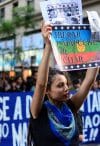Brazil

The Criminalization of Indigenous Resistance
Indigenous peoples of the Americas are on the frontlines of resistance to the environmental and social costs of the unthinking drive for capital accumulation. From the United States and Canada to Brazil and Chile, that resistance has been met by state surveillance, repression, and criminalization. | more…

Corruption, Neoliberalism, and the Primary Sector
In discussing the Brazilian situation, it is easy to focus on the dramas of individual politicians and institutions. But to look only at this level of the crisis is to ignore the deeper economic conditions that have driven the country’s politics to the edge.… The deeper contradiction, however, lies with the natural-resource economy, in which government revenue and social spending require royalties that are controlled by a small, unaccountable elite…. The left’s only viable response…is to demand a radical restructuring of the primary sector and a reinvigorated opposition to neoliberalism. | more…
Analyzing the Brazilian economy is a difficult and complex task; the current indicators register results ranging from excellent to mediocre and worrisome, depending on the variable observed. For example, the nation has advanced into modernity in a few sectors, while at the same time, in recent years, new forms of dependency from the center of capitalism deepened. Further complexities arise when, beyond the economy, one takes into consideration not only the results of so-called “inclusion” policies and the popularity of President Dilma Rousseff (popularly referred to as “Dilma”), but also the number of strikes and public displays of disenchantment that are emerging in every corner of the country.… To summarize some of the conclusions: since the government of Luis Inácio Lula da Silva (“Lula”), the Brazilian economy has widened its internal market through policies that have raised the minimal wage, transferred income to the poorest within the nation, increased the availability of credit to the low and middle segments of the population, and reduced taxation (mainly on manufactured goods in the essential consumption basket). Such widening of the market, with a low impact on imports, would in theory ensure the maintenance of a certain level of growth, regardless of the international dynamics, and, indeed, it has helped Brazil reach a positive economic performance during the worst of the recent global economic crisis and its aftermath.… Nonetheless, when the impacts of the global recession deepened with the sovereign debt crisis in Europe, these macroeconomic policies did not yield the same effect, at most achieving modest growth. | more…
In late November 2006 John Bellamy Foster traveled to Brazil where he delivered addresses on the global ecological devastation of capitalism, and the need for worldwide ecosocialist resistance, at two universities in the state of Santa Catarina: the Regional University of Blumenau and the Federal University of Santa Catarina in Florianópolis. These talks were part of the third annual Bolivarian Days Conference organized by the Institute of Latin American Studies in Brazil. The theme this year was “Social Theory and Eurocentrism in Latin America: The Insurgency of Critical Thought.” The conference provided ample evidence of the vitality of socialist and anti-imperialist critiques both in Brazil and in Latin America as a whole in what is clearly a new era of revolt | more…

